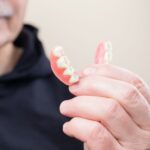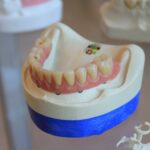Are you curious about dentures? Have you ever wondered what goes into creating those perfect smiles? Look no further! In this article, we will unveil some intriguing facts about dentures that will not only expand your knowledge but also enhance your appreciation for this vital aspect of dental health. Whether you’re a seasoned prosthodontist or simply someone interested in oral care, get ready to be fascinated by the world of dentures. Let’s dive in and explore the wonders behind these life-changing dental devices.

Interesting Facts About Dentures
Dentures, those marvelous devices that help restore smiles and improve chewing abilities, have a long and fascinating history. Today, let’s take a closer look at these amazing dental prosthetics and unveil some intriguing facts that will surely pique your interest. So, fasten your seatbelts and get ready to dive into the captivating world of dentures!
A Brief History Lesson
Did you know that dentures have been around for centuries? In fact, their origins can be traced back to ancient civilizations. The first evidence of dentures dates back to 700 BC in northern Italy, where the Etruscans used animal teeth and bone to create dentures for missing teeth. Talk about resourcefulness!
Fast forward to the 18th century, and you’ll find that dentures made quite the fashion statement among the elite. Back then, wooden dentures were the go-to choice for those seeking to replace their missing pearly whites. However, these early dentures were far from perfect. Imagine trying to chew your food with a set of wooden teeth! Ouch!
Fun Fact: “Wooden dentures may have been fashionable, but they definitely lacked the comfort and functionality we enjoy in modern dentures.”
Denture Materials – Putting Science to Work
Today’s dentures are a testament to the impressive advancements in dental materials and techniques. In the search for optimal comfort and aesthetics, denture materials have come a long way. Let’s break it down, shall we?
Acrylic Resin: When it comes to denture bases, acrylic resin takes the crown. This versatile material is widely used for its durability, affordability, and ease of adjustment. Thanks to modern technology, denture wearers can enjoy lightweight and natural-looking prosthetics that blend seamlessly with their remaining teeth.
Porcelain: Looking for that extra touch of elegance? Porcelain teeth are the way to go. With their lifelike appearance and superior stain resistance, porcelain teeth offer a level of aesthetics that is hard to beat. Just imagine how your smile would glow!
Flexible Dentures: If you’re looking for a more comfortable alternative to traditional dentures, consider flexible dentures. Made from a special type of thermoplastic material, these dentures provide a snug fit, allowing for increased comfort and enhanced chewing ability. Plus, the absence of metal clasps means no more awkward moments during social gatherings!
Remember: “From acrylic resin to porcelain and flexible options, the world of denture materials offers a wide array of choices to cater to individual needs and preferences.”
A Perfect Fit: Denture Impressions
Ever wondered how dentists achieve that impeccable fit when crafting dentures? The secret lies in the art of taking dental impressions.
First, the dentist carefully takes an impression of the patient’s mouth, capturing all the intricate details of their gums and any remaining teeth. This impression serves as the blueprint for creating a customized denture that fits snugly and comfortably.
Next, the dental laboratory technician skillfully uses the dental impression to fabricate a trial denture. This trial denture is then tested in the patient’s mouth to ensure a precise fit and optimal oral function.
Finally, any necessary adjustments are made to perfect the denture, allowing the patient to enjoy a comfortable and functional smile.
Insider Tip: “A well-fitting denture not only enhances your appearance but also improves your ability to chew and speak with confidence.”
Overcoming Challenges: Denture Adhesive
While dentures are designed to fit securely in the mouth, some individuals may find that additional support is needed. That’s where denture adhesive comes into play. This easy-to-use product acts as a temporary solution, providing extra stability and preventing dentures from slipping or shifting during daily activities.
However, it’s important to note that denture adhesive should never be used as a substitute for properly fitting dentures. If you find yourself relying heavily on adhesive to keep your dentures in place, it’s essential to visit your dentist for a denture adjustment or reline.
Pro Tip: “Denture adhesive can be a helpful tool, but it’s crucial to address the underlying issue if you find yourself needing excessive adhesive for denture stability.”
Maintaining Your Dentures: Dos and Don’ts
To keep your dentures in tip-top shape and ensure optimal dental health, proper care and maintenance are essential. Here are some key dos and don’ts to remember:
Do:
– Remove and rinse your dentures after eating to remove food particles.
– Brush your dentures daily using a soft-bristled brush and non-abrasive denture cleaner.
– Soak your dentures in water or a denture-soaking solution when not in use.
– Schedule regular check-ups with your dentist to assess the fit and condition of your dentures.
Don’t:
– Use hot or boiling water to clean your dentures, as this can cause warping.
– Use abrasive materials or harsh chemicals to clean your dentures, as they can damage the surface.
– Wear your dentures while sleeping, as this can impede oral hygiene and lead to denture-related issues.
Takeaway: “By following these simple guidelines, you can enjoy the benefits of well-maintained dentures and preserve your oral health for years to come.”
And there you have it – a captivating glimpse into the world of dentures. From their ancient origins to the latest innovations in dental materials and techniques, dentures have certainly come a long way. So, the next time you flash your dazzling smile, take a moment to appreciate the remarkable journey that your dentures have embarked on to restore your dental health and confidence.
Reflect: “Now that you’re armed with these intriguing facts about dentures, why not share them with your friends and family? After all, knowledge is meant to be shared!”
Dentures have been around for centuries, offering a reliable solution for people missing teeth. But did you know that there are fascinating facts about dentures that you may not be aware of? From their historical origins to the advancements in modern dentistry, exploring the world of dentures can be a captivating journey. Discover the intriguing facts about dentures by clicking here and delve into the fascinating world of dental prosthetics.
Interesting Facts About Dentures:
Did you know that the intricacies of dentures have evolved over the years? With the latest advancements in denture technology, patients now have access to better fitting and more natural-looking dentures than ever before. From improved materials to innovative manufacturing techniques, these advancements have revolutionized the practical applications for patients. Discover the fascinating world of dentures and learn about the intricacies of dentures at our website: intricacies of dentures. Stay updated on the latest advancements in denture technology and uncover the endless possibilities for your smile by visiting latest advancements in denture technology. Find out how these practical applications can benefit you and enhance your quality of life at practical applications for patients. Embrace the exciting possibilities of dentures and explore the world of dental innovation today!
Complete Dentures: A Comprehensive Guide
[youtube v=”SUYM2WNZSdE”]
Dentures have been an effective solution for replacing missing teeth for centuries. The concept of complete dentures, which replace all the teeth in the mouth, has provided countless individuals with the ability to chew, smile, and socialize confidently. In this article, we will explore the process of getting complete dentures, their advantages, maintenance tips, and the cost associated with them.
The Process of Getting Complete Dentures
The journey to acquiring complete dentures typically involves several appointments with your dentist. During the initial visit, the dentist takes impressions of your mouth to create a customized denture that fits snugly and comfortably. In the subsequent appointments, you will go through a wax bite and trial stage to ensure the bite, look, and feel of the dentures meet your satisfaction. Finally, the fitting stage involves transforming the trial dentures into hard plastic dentures that cover the palate and stay in place either through suction or the use of a denture fixative.
“Through a series of appointments, your dentist will ensure that your complete dentures are tailored to your specific needs, providing you with comfort and functionality.”
The Importance of Maintenance
To keep your complete dentures in good condition and ensure oral hygiene, it is vital to follow a regular cleaning and maintenance routine. After each meal, it is recommended to remove your dentures and rinse them thoroughly. Using a soft-bristled denture brush and soap or a denture cleaner, gently clean any food particles around the teeth. Remember to avoid using toothpaste, as it may be abrasive and damage the dentures. Additionally, leaving dentures in water overnight helps to prevent warping.
“Proper care and maintenance of your dentures are essential to prolong their lifespan and maintain oral health.”
The Value of Regular Dental Check-ups
While having complete dentures replaces your natural teeth, it is still crucial to continue visiting your dentist regularly. Dental check-ups go beyond examining your teeth; they also evaluate the health of the soft tissues in your mouth, including ulcers, lumps, bumps, and cysts. By maintaining these regular check-ups, you can ensure the overall health of your mouth and detect any abnormalities at an early stage.
“Regular dental check-ups play a vital role in ensuring the long-term health of your mouth, even with complete dentures.”
Complete Dentures on the NHS and Privately
If you require complete dentures, you have the option to receive them through the NHS or from a private dentist. On the NHS, the cost of complete dentures is £269.30, covering the expenses for both upper and lower dentures. However, if you choose to seek complete dentures from a private dentist, the cost can be around £1,000.
Conclusion
Complete dentures offer a comprehensive solution for individuals who have lost all their teeth. Through a process involving custom impressions and multiple appointments, dentists ensure that the dentures fit comfortably and allow for proper functionality. With regular care, maintenance, and dental check-ups, individuals can maintain the health of their mouth and enjoy the benefits of complete dentures. Whether obtained through the NHS or privately, complete dentures provide the ability to chew, smile, and socialize with confidence.
“With complete dentures, individuals can reclaim their ability to eat, smile, and enjoy social interactions, leading to a better quality of life.”
FAQ
Question 1: What are dentures?
Answer 1: Dentures are removable dental appliances that are custom-made to replace missing teeth and the surrounding tissues. They can be either full dentures, which replace all the teeth in the upper or lower jaw, or partial dentures, which replace only a few missing teeth.
Question 2: How long do dentures last?
Answer 2: The lifespan of dentures can vary depending on various factors such as oral hygiene, wear and tear, and changes in the mouth over time. On average, dentures can last about 5 to 7 years. However, with proper care and regular maintenance, dentures can potentially last even longer.
Question 3: Can dentures improve my ability to eat and speak?
Answer 3: Yes, dentures can significantly improve your ability to eat and speak. When you have missing teeth, it can be challenging to chew certain foods and pronounce certain words. Dentures restore your ability to chew properly and speak clearly, enhancing your overall quality of life.
Question 4: Are there different types of denture materials available?
Answer 4: Yes, there are different types of denture materials available. The most common materials used for dentures include acrylic resin and porcelain. Acrylic resin dentures are lightweight, durable, and easily adjustable. Porcelain dentures, on the other hand, are known for their natural appearance and stain resistance.
Question 5: Do dentures require any special care?
Answer 5: Yes, dentures require regular care to ensure their longevity and optimal oral health. It is essential to clean your dentures daily, removing any food particles and plaque. Dentures should be brushed with a soft-bristled brush and soaked in a denture cleanser overnight. It is also crucial to regularly visit your dentist for check-ups and adjustments to maintain a proper fit.
















